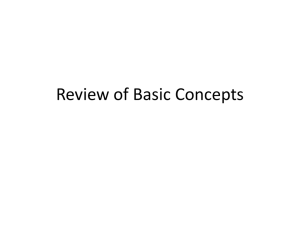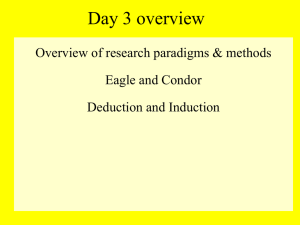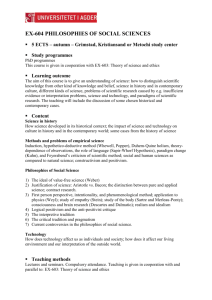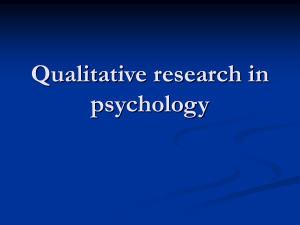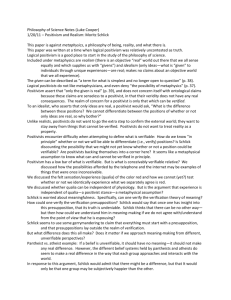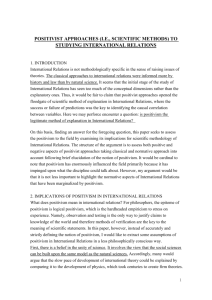Facilitation answers to positivism Atte and Tiina
advertisement
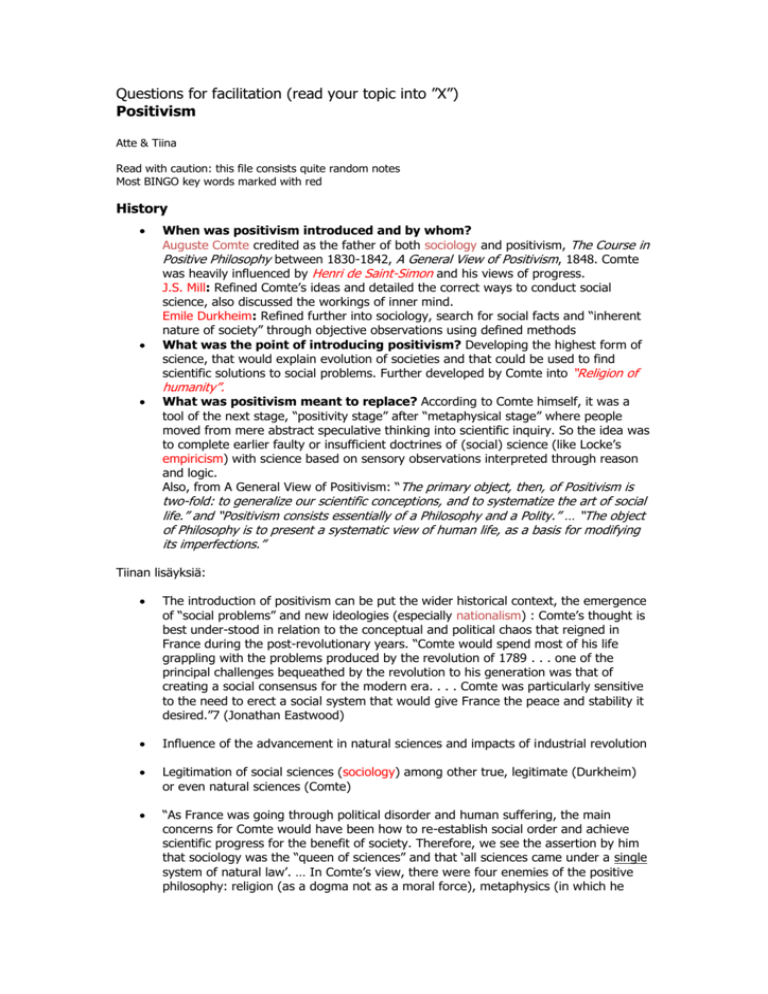
Questions for facilitation (read your topic into ”X”) Positivism Atte & Tiina Read with caution: this file consists quite random notes Most BINGO key words marked with red History When was positivism introduced and by whom? Auguste Comte credited as the father of both sociology and positivism, The Course in Positive Philosophy between 1830-1842, A General View of Positivism, 1848. Comte was heavily influenced by Henri de Saint-Simon and his views of progress. J.S. Mill: Refined Comte’s ideas and detailed the correct ways to conduct social science, also discussed the workings of inner mind. Emile Durkheim: Refined further into sociology, search for social facts and “inherent nature of society” through objective observations using defined methods What was the point of introducing positivism? Developing the highest form of science, that would explain evolution of societies and that could be used to find scientific solutions to social problems. Further developed by Comte into “Religion of humanity”. What was positivism meant to replace? According to Comte himself, it was a tool of the next stage, “positivity stage” after “metaphysical stage” where people moved from mere abstract speculative thinking into scientific inquiry. So the idea was to complete earlier faulty or insufficient doctrines of (social) science (like Locke’s empiricism) with science based on sensory observations interpreted through reason and logic. Also, from A General View of Positivism: “The primary object, then, of Positivism is two-fold: to generalize our scientific conceptions, and to systematize the art of social life.” and “Positivism consists essentially of a Philosophy and a Polity.” … “The object of Philosophy is to present a systematic view of human life, as a basis for modifying its imperfections.” Tiinan lisäyksiä: The introduction of positivism can be put the wider historical context, the emergence of “social problems” and new ideologies (especially nationalism) : Comte’s thought is best under-stood in relation to the conceptual and political chaos that reigned in France during the post-revolutionary years. “Comte would spend most of his life grappling with the problems produced by the revolution of 1789 . . . one of the principal challenges bequeathed by the revolution to his generation was that of creating a social consensus for the modern era. . . . Comte was particularly sensitive to the need to erect a social system that would give France the peace and stability it desired.”7 (Jonathan Eastwood) Influence of the advancement in natural sciences and impacts of industrial revolution Legitimation of social sciences (sociology) among other true, legitimate (Durkheim) or even natural sciences (Comte) “As France was going through political disorder and human suffering, the main concerns for Comte would have been how to re-establish social order and achieve scientific progress for the benefit of society. Therefore, we see the assertion by him that sociology was the “queen of sciences” and that ‘all sciences came under a single system of natural law’. … In Comte’s view, there were four enemies of the positive philosophy: religion (as a dogma not as a moral force), metaphysics (in which he included psychology), individualism (which to him was the cause of social disorder) and revolutionary utopianism.” (Deepak Tripahti) What are the main features of positivism? What do they mean, one by one? From Comte: - Objective basis of the system: “External Order if the World, as revealed by Science” - Objectivism - Empiricism; only observations together with reason and logic can form knowledge - Idea of linear social evolution, through three stages (theological -> metaphysical -> positivity) - Introspective and intuitive knowledge have no place, as they cannot be observed More generally (Raunio, 1999): - Phenomenalism: Only direct sensory observations are trustworthy source of information about reality - Nominalism: Abstract concepts should be deduced from observations. General terms and abstract notions exist to compress observed things. - Denying value based structures or normative statements as knowledge: values do not have the status of knowledge. - Methodological naturalism: Belief that the scientific logic is exactly the same on every field of study. Differences in disciplines are because of different maturity stages of different sciences. The ways of natural science should be brought to social science. - General laws as the goal of science: Science in all fields of study should aim to produce theories that are based on universal, general laws. The more universal, the better. Tiinan lisäyksiä: The co-evolution of sociology & positivism. Founding fathers of sociology (Comte, Mill & Durkheim) advancing positivism along with advancing scociology. Emphasis on macro-level issues. Scholars & thinkers: Herbert Spencer (1820-1903) Applying theory of natural selection to society Influence on Durkhiem´s thinking Society is constantly facing selection pressures (internal and external) that force it to adapt its internal structure through differentiation Recognized three functional needs or prerequisites that produce selection pressures: they are regulatory, operative (production) and distributive Also strong critique of Comte, based on Comte´s emphasis on government (rejection of individualism) “freedom increased to the greatest amount possible – one in which human nature will have become so moulded by social discipline into fitness for the social state, that it will need little external restraint, but will be self-restrained – one in which the citizen will tolerate no interference with his freedom” Still, Spencer was a positivist. He may have taken issue with the law of three stages, but what he offered in its place was very similar: ‘intermediate steps’ between the extremes – theology and science. (Wikipedia & Deepak Tripahti) J.S. Mill Mill agreed with Comte that the study of society had been retarded by its failure to employ scientific methods; and he was in agreement with the empirical methods recommended by Comte, including observation, experiment, comparison and historical methods. However, being a strong supporter of individual liberty, Mill dissented from other aspects of Comte’s ideas. If Comte was the pioneer who founded positivism, Spencer, and Mill, representing the British school, followed. Durkheim 1858-1917: Hypothetico-deductive model = According to it, scientific inquiry proceeds by formulating a hypothesis in a form that could conceivably be falsified by a test on observable data. Epistemological realism Sociology aims at discovering social facts (Social facts consist of manners of acting, thinking and feeling external to the individual, which are invested with a coercive power by virtue of which they exercise control over him.) Structural functionalism, seeing society as a complex system whose parts work together to promote solidarity and stability.[1] Macro-level orientation, which is a broad focus on the social structures that shape society as a whole, and believes that society has evolved like organisms. Historical background: Modernization Establishing sociology in France Variation and internal competition What forms did X take (or what forms has it taken)? - Was further developed into logical positivism within Vienna Circle and Berlin Circle 1920s and 1930s. Logical positivism promoted more radical form of empiricism, and emphasized verification and unity of all sciences. Philosophy seen merely as a critique of language. Tiinan lisäyksiä: Vienna Circle were debating in the wake of the devastation caused by the Second World War. Under the leadership of Moritz Schlick, the Vienna Circle Argued for a ‘reduction of human knowledge to scientific and logical foundations’. To separate itself from positivism, the Vienna Circle adopted the term ‘logical positivism’. One of its most significant characteristics was its Rejection of the non-empirical statements made in metaphysics, theology, and ethics as meaningless. Ethics and morality as matters of taste and not connected to science Science tells only what will happen, not what should happen. (Tripahti): “Peter Halfpenny makes a further distinction between positivism of Comte and that of the Vienna Circle. Logical positivism, he says, was scientistic but not progressive or social reformist. And, he adds that the Vienna Circle believed the growth of science would benefit humankind but would not do so necessarily.” - The influence of positivism was highest between world wars, but the idea is still influential “Straw man positivism”, positivism as anti-methodology, as something emphasizing all the non-positivist views are note, constructed by the critics and opponents of positivism Karl Popper’s falsificationism or critical rationalism, emphasizing falsifiability of any scientific statement Postpositivism; recognizing the limitations of scientific work in practice, which results in imperfect and probabilistic laws. Quite aligned in this sense with Mill actually. Positivism now often equated with quantitative research in general. Tiinan lisäyksiä – About postpositivim: For example, there are those who reject the positivist view that the aim of scientific investigation should be to find regularities between events, or laws that can be used to make society better; rather, they say, human behaviour cannot be determined by external laws and the investigation should be into the underlying causes of events (Critical Realism). Then there are advocates of social inquiry by interpretation (Interpretive account). Some say there should be a strict separation between objectivity and all value judgements (Ideal types). Still others regard theories as catalytic agents that will overthrow, or replace the established order and create something new (Critical Theory). There are advocates of social inquiry into the actions of individual actors (Methodological Individualism) and of inquiry within a framework (Functionalism). … - Positivism was about understanding the world so that we could predict and control it by changing laws. In a period of chaos in Europe, it was for order and unity. Post-positivism has renounced unity and represents ‘methodological pluralism’. (Tripathi) Social context: intensification of the ideological war since 1950s, followed by the defeat of Communism in the Soviet Union and Eastern Europe in the 1990s. The United States and West European countries have enjoyed an increasing degree of individual freedom and prosperity in the second half of the twentieth century. Countries of the former Communist bloc are rapidly moving towards that goal. This is reflected in the ‘pluralism’ of the postpositivist era. Debra Morris has provided an account that distinguishes post-positivism from its predecessor and suggests some common features within its components. According to Morris, post-positivism represents: (1) a determination to free theoretical speculation from strict dependence on confirming data (2) gives the theory component ‘a pride of place’ and approaches science in a philosophical way, and (3) opens a direct link to democratic theory. Common between positivism and post-positivism. Rejection of metaphysical inquiry in favour of science was the most important feature of positivism. It remains among the foundations of modern social inquiry. The role of theory and science was always crucial for positivists.[17] So it is today. To Comte, positivism had practical value and the growth of science was for the benefit of humankind. Most post-positivist scholars would not deny that such reformist tendencies remain among their underlying objectives. Data collection and analysis are still part of social inquiry. (Tripathi) Also Marxism stemmed in some sense from positivism (social progress) Is there (or has there been) competition between different interpretations of X? - For positivism as scientific philosophy perhaps not that much, since it is so clearly defined. But Comte’s original ideas have been refined in many directions. Afterwards the linear social progress component of positivism has been in smaller role or forgotten, nowadays positivism more connected to the way it represents social science. What kind of competition? - Verification vs. falsification was one track of competition. - Who won (or who is winning)? - In some sense both, but perhaps verification more. Less emphasis today is on falsification and Popperian view of science. Tiinan kommentit: Different post-positivistic orientations & orientations defending Comte´s tradition Ongoing discussion about the positivistic nature of large extent of social science research: instrumentalism of positivism (see Kincholoe & Tobin 2009: The much exaggerated death of positivism) Criticism and external competition How has X been criticized after its introduction? - Early critique: Hegel and Marx opposed social empiricism. Mill criticized certain methods and applications (“good Comte” vs. “bad Comte”) Tiinan havainto: Historicism – war between French positivism – German historicism Marx: historical materialism (echoes of comte –social progess) About historicism: Seems to be understood in two different ways, in a positivistic way as historical laws, and in relativist way neglecting positivism and emphasizing the historical context and variety (time & place & context having an influence not generalizable) - Antipositivism, criticized positivism as “scientism”. Not all phenomena can and should be studied objectively. Interpretation important, lacking in positivism. Also, not all explanations should be out of history and context and generalizable. Tiinan havaintoja: Quite soon antipositivist reaction & non-positivist theories in sociology: Simmel & Weber, Frankfurt school & critical school (Hockheimer): neo-kantianism & phenomenology, feminist research, Marxist research Nimiä: Simmel (micro sosiology), Thomas Kuhn, Foucault Max Weber 1864-1920 key proponent of methodological antipositivism, arguing for the study of social action trough interpretive (rather than purely empiricist) means understanding the purpose and meaning individual give to their own action processes of rationalization, secularization and disenchantment associated to capitalism and modernity result: new ways of thinking about the world against Marx´s ideal of historical materialism instead importance of cultural influences embedded in religion (Wikipedia) Georg Simmel (1858-1918) one of the first generation of German sociologists Neo-Kantian approach which laid the foundations for sociological antipositivism Asking 'What is society?' in a direct allusion to Kant's question 'What is nature?', Culture referred to "the cultivation of individuals through the agency of external forms which have been objectified in the course of history". (Wikipedia) Both Simmel and Weber's nonpositivist theory would inform the eclectic critical theory of the Frankfurt School.[4] (Wikipedia) Thomas Samuel Kuhn (/ˈkuːn/; July 18, 1922 – June 17, 1996) Paradigm sifts in science Competing paradigms are frequently incommensurable; that is, they are competing and irreconcilable accounts of reality. Thus, our comprehension of science can never rely wholly upon "objectivity" alone. Science must account for subjective perspectives as well, since all objective conclusions are ultimately founded upon the subjective conditioning/worldview of its researchers and participants Kuhn's work has been extensively used in social science; for instance, in the post-positivist/positivist debate within International Relations. The Structure of Scientific Revolutions (SSR) was originally printed as an article in the International Encyclopedia of Unified Science, published by the logical positivists of the Vienna Circle. Associated to relativism, which he himself denied Frankfurt school and antipostivism Formed during the interwar period in Germany Consisted of dissidents who were at home neither in the existent capitalist, fascist, nor communist systems that had formed during the interwar period. Meanwhile, many of these theorists believed that traditional theory could not adequately explain the turbulent and unexpected development of capitalist societies in the twentieth century loosely affiliated, Frankfurt School theorists spoke with a common paradigm in mind, sharing the same assumptions and being preoccupied with similar questions. [2] To fill in the perceived omissions of traditional Marxism, they sought to draw answers from other schools of thought, hence using the insights of antipositivist sociology, psychoanalysis, existential philosophy, and other disciplines. Max Horkheimer opposed his critical theory to traditional theory, which refers to theory in the positivistic, scientistic, or purely observational mode – that is, which derives generalizations or "laws" about different aspects of the world. Drawing upon Max Weber, Horkheimer argued that the social sciences are different from the natural sciences, inasmuch as generalizations cannot be easily made from so-called experiences, because the understanding of a "social" experience itself is always fashioned by ideas that are in the researchers themselves. What the researcher does not realize is that he is caught in a historical context in which ideologies shape the thinking; thus theory would be conforming to the ideas in the mind of the researcher rather than the experience itself: (Wikipedia) What external competition has emerged after the introduction of X? - Different forms of antipositivism, which explicitly rejects and criticize positivism, and postpositivism, that does not directly abandon it but rather adapt it to its limitations. - Positivism vs. antipositivism also has a role in the frequently occurring debate of natural science versus social sciences (like the Science Wars in 1990’s in the U.S., and Sokal hoax by Alan Sokal), although there the target of positivists have been the most extreme postmodernist views which see science as a social construct first and foremost. Who won (or who is winning) in that competition? - Positivism in its purest form lost, at least in social sciences. Very few researchers identify themselves as positivists or logical positivists. Quantitative research and postpositivism has however still its place. Difference between European and the U.S. (or Anglo-Saxon) academic tradition. The former has more distance to positivism, the latter less. Outside “soft” social sciences, positivism is still quite apparent. Bigger picture How did X (or its most successful forms) succeed in reaching the aim? - In its aim to lay the basis for social science, positivism was successful: It and its refined forms were the mainstream way for decades and still continue to influence. But it is no longer the only paradigm and the big picture it had on the structure and hierarchy of sciences is largely dismissed. - In the aim of guiding linear social development, the philosophy was less successful. Tiinan lisäys: “Modern day sociologists do not see the development of one 'true' vision of society as a goal for sociology as Comte did.” (Blog by Daniel Little – ylläri!!!) Various attempts to negotiate positive approaches & positivist ontology (macroquantitative approaches) with more constructive micro level – often qualitative research - approaches. Also attempts to negotiate positivist and constructionist ontology, see one example: Cupchik 2001 - note: not all positivist research is quantitative, and vice versa On the other hand – some rejecting social sciences and advocating human sciences (Daniel Little) In the way positivism and it´s counter reactions (antipositiism) are build to the foundations of social sciences, it is present in all social sciences all the time And, last but not least, if this has not been answered already, if “X” is the answer, what was the question? - The original question as Comte saw it was something along the lines of “How should science of society be constructed so that it can guide social progress” ≈≈≈ Questions to be considered in your subsequent work (in the preparation of the detailed presentation of your approach and methodology – and in your future research) What is X’s relation to my work? If I am working within X, what is my justification for the choice? If I am not working within X, why (what is my justification for not choosing X as my primary approach)? What is my approach (if not X)? Why do I think that my approach is the best for my purposes? Sources: Comte, A., 1848, A General View of Positivism, English version by J.H.Bridges, 1975, Robert Speller & Sons, New York, U.S. Raunio, K., 1999, Positivismi ja ihmistiede – Sosiaalitutkimuksen perustat ja käytännöt, Gaudeamus, Helsinki, Suomi. Wikipedia entries: Positivism, Auguste Comte, Antipositivism, Karl Popper, Emile Durkheim, John Stuart Mill, Religion of Humanity, Logical positivism, Postpositivism, Science Wars, Tiinan lähteitä: The Relevance of Positivism in Social Science. Blog post by Deepak Tripathi: https://deepaktripathilibrary.wordpress.com/2008/01/21/the-relevance-of-positivism-insocial-science/ Eastwood, J. (2004), Positivism and Nationalism in 19th Century France and Mexico. Journal of Historical Sociology, 17: 331–357 Wikipedia entries: Samoja kuin yllä, + Herbert Spencer, Metaphysics, Neo-Kantianism, Max Weber, Geor Simmel etc. CUPCHIK, Gerald. Constructivist realism: an ontology that encompasses positivist and constructivist approaches to the social sciences. In: Forum - Sozialforschung/Forum: Qualitative Social Research. 2001. Kincheloe, Joe L., and Kenneth Tobin. "The much exaggerated death of positivism." Cultural Studies of Science Education 4.3 (2009): 513-528. http://www.philosophybasics.com/branch_logical_positivism.html



